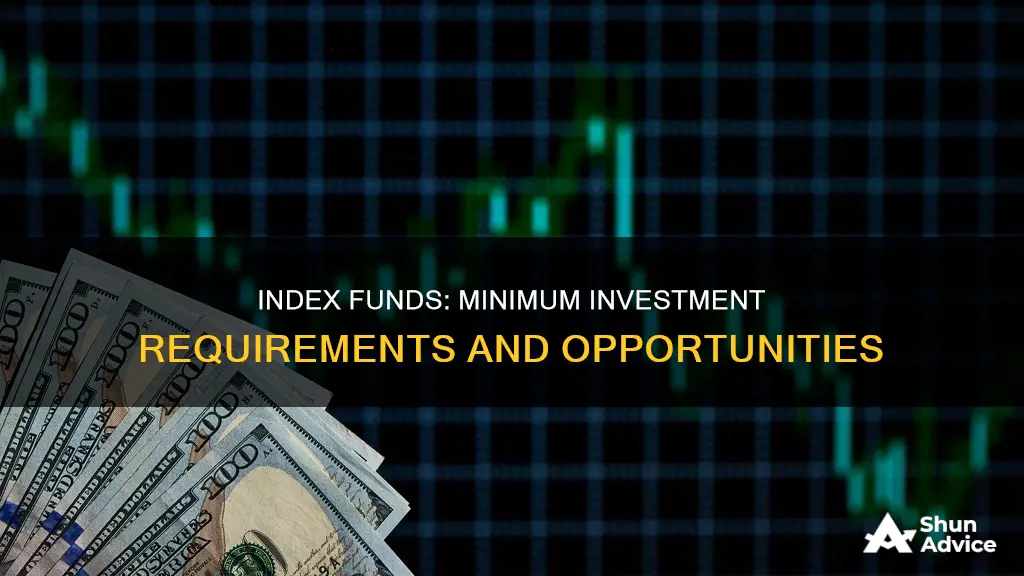
Index funds are a great way to build wealth over time, especially for retirement. They are a group of stocks that mirror the performance of an existing stock market index, such as the S&P 500. So, what is the minimum amount required to invest in index funds?
The minimum investment depends on the fund and your broker's policies. Some funds have no minimum investment amount, while others may require a minimum initial investment of between $500 to $5,000. If your broker allows you to buy fractional shares, you may be able to invest with as little as $1.
It's important to note that index funds have lower fees and expenses than actively managed funds, making them a cost-effective way to gain exposure to a broad range of stocks or bonds.
| Characteristics | Values |
|---|---|
| Minimum amount to invest in index funds | Varies depending on the fund and broker. Some funds have no minimum, while others require a minimum initial investment of between $500 to $5,000. |
| Advantages of index funds | Lower fees, market representation, transparency, historical performance, tax efficiency |
| Disadvantages of index funds | Lack of flexibility, automatic inclusion of all securities in an index, market-cap weighting |
What You'll Learn

Index funds are a low-cost, passive investment strategy
Index funds are a low-cost way to track a specific group of investments, which can be more broadly diversified than individual stocks and simpler to buy than each of the individual holdings within the index. They are very popular for people looking to invest in a group of investments in a simple and cost-effective way. Index funds are also popular with retirement investors.
Index funds are a passive investment strategy that aims to maximize returns by minimizing the costs of buying and selling securities. Index investing is one common passive investing strategy. Using it, investors purchase the securities in a representative benchmark, such as the S&P 500 index, and hold them for a long time. Passive investing is typically done by investing in a mutual fund or exchange-traded fund (ETF) that mimics the index’s holdings, either exactly or approximately.
The minimum amount required to invest in a mutual fund can run as low as nothing or as high as a few thousand dollars. Once you’ve crossed that threshold, most funds allow investors to add money in smaller amounts. Many mutual funds require minimum investments to ensure sufficient capitalization and cover their operating costs. These minimums can typically range from $500–$5,000 for investors, but they may be significantly larger for institutional investor class funds.
Derivatives: A Mutual Fund's Strategic Investment Choice
You may want to see also

Minimum investment depends on the fund and broker
The minimum investment depends on the fund and broker. Some mutual funds require minimum investments to ensure sufficient capitalization and cover operating costs. These minimums typically range from $500 to $5,000 for investors, but they may be significantly larger for institutional investor class funds. For example, institutional class funds and hedge funds require minimums of at least $100,000 or more.
However, several mutual funds now offer $0 minimums, meaning even $5, $10, or $100 can be enough to get started. For instance, Fidelity offers several mutual funds with $0 minimums, and the Charles Schwab Corporation (SCHW) offers a broad market index fund and target-date funds with no minimum initial purchase.
The minimum investment also depends on the type of account. For example, the T. Rowe Price New Era Fund (PRNEX) requires a $2,500 minimum initial purchase for its mutual funds held in non-retirement accounts but only $1,000 for retirement accounts like IRAs. Similarly, 529 college savings plans and Uniform Transfers to Minors Act (UTMA) accounts usually have much lower fund minimums, and some fund companies allow the minimum to be met through systematic purchases as low as $25 per month.
When deciding where to open an account, it's important to consider the fund selection, convenience, trading costs, impact investing options, and commission-free options. For example, if you want to purchase index funds from various fund families, a discount broker's lineup may be more limited than a mutual fund company. Additionally, a mutual fund company may be a better choice if you only plan to invest in mutual funds, while a discount broker may be preferable if you require sophisticated stock research and screening tools.
In summary, the minimum investment for index funds varies depending on the fund and broker, with some funds offering $0 minimums and others requiring minimums of $100,000 or more. When deciding where to open an account, it's essential to consider factors such as fund selection, convenience, and trading costs to find the best option for your needs.
Savings Strategy: Mutual Funds Investment Allocation
You may want to see also

Mutual funds vs index funds: pros and cons
The minimum amount required to invest in index funds varies. Some funds have no minimum investment amount, while others require a minimum initial investment of between $500 to $5,000. Institutional investor class funds and hedge funds may require minimums of at least $100,000 or more.
Now, let's compare mutual funds and index funds in terms of pros and cons.
Mutual Funds:
Pros:
- Actively managed by professional fund managers who aim to outperform the market.
- Offer the potential for higher returns than index funds.
- Provide more flexibility and the ability to pivot away from the market during downturns.
- Allow for more targeted investments in specific sectors, niches, or individual stocks.
Cons:
- Tend to have higher fees and expense ratios due to active management, research, and trading costs.
- May underperform the market over the long term, despite higher fees.
- Can be more complex and require more active involvement in managing the investment portfolio.
- May have higher turnover rates, triggering more capital gains distributions and taxable events for investors.
Index Funds:
Pros:
- Passively managed, seeking to mirror the performance of a specific market index.
- Generally have lower fees and expense ratios due to passive management and lower trading costs.
- Historically, they have often outperformed actively managed funds over the long term, especially after accounting for fees.
- Provide broad market exposure and instant diversification across various sectors and asset classes.
- Are considered more tax-efficient due to lower turnover rates, resulting in fewer taxable events for investors.
Cons:
- Lack flexibility as they are designed to mirror a specific market index and cannot pivot during market shifts.
- May include all the securities in an index, including overvalued or weak companies.
- Are susceptible to market risk, and investors cannot control the individual securities within the index.
- May have limited trading flexibility, as some index funds are only bought and sold at the end of the trading day.
Dubai Residents: Invest in US Mutual Funds
You may want to see also

Index funds are safer than individual stocks
Minimum Investment in Index Funds
The minimum investment required to start investing in a mutual fund can range from no minimum at all to $5,000. Many mutual funds require minimum investments to ensure sufficient capitalization and cover operating costs. However, some funds now offer $0 minimums.
Index Funds Safer than Individual Stocks
Index funds are generally considered safer than individual stocks due to their inherent diversification. They track a specific market index, such as the S&P 500, which means they contain a broad range of stocks across various sectors. This diversification benefit lowers the risk of losing money since a single company's poor performance will not significantly impact the overall fund.
Index funds are passively managed, aiming to mirror the performance of their underlying index. This passive strategy means they don't actively pick securities or time the market, resulting in lower fees than actively managed funds. Over time, index funds have often outperformed actively managed funds, especially after accounting for fees and expenses.
Additionally, index funds offer broad market exposure and diversification across sectors and asset classes. They are also more tax-efficient than actively managed funds due to lower turnover rates, resulting in fewer capital gains distributions.
However, critics argue that index funds lack flexibility since they decline in value when the market does and cannot pivot away from market shifts. They also automatically include all securities in an index, which may include overvalued or weak companies.
In summary, index funds are generally safer than individual stocks due to their diversification, lower fees, broad market exposure, and historical performance. However, they may not provide the same level of flexibility and active management as other investment options.
High-Risk Mutual Funds: Worth the Investment Gamble?
You may want to see also

Index funds are good for beginners
Index funds are a great investment option for beginners. Here are some reasons why:
Simplicity and Low Costs
Index funds are passive investments that aim to mirror the performance of a specific market index, such as the S&P 500. They are considered a low-cost, easy way to build wealth over the long term. The funds have lower expense ratios compared to most actively managed funds, and these fees have been declining over the years. For example, the average fee for an index fund is currently 0.05%, with some funds offering even lower ratios.
Diversification
Index funds provide instant diversification as they allow you to invest in a broad range of stocks or bonds across various sectors and asset classes. This diversification reduces risk and helps to minimize losses, as a single poorly performing company will have a smaller impact on the overall fund.
Performance
Index funds have historically performed well, often outperforming actively managed funds. The S&P 500, for instance, has posted an average annual return of nearly 10% since 1928.
Accessibility
Index funds are accessible to beginner investors as they often have low minimum investment requirements, with some funds offering $0 minimums. This makes it possible to get started with a small amount of money and gradually build your investment over time.
Ease of Management
Index funds are also a good option for beginners as they require less hands-on management compared to other investments. They are designed to mirror the performance of a specific index, so they don't require active security selection or market timing. This makes them a more passive investment strategy.
Overall, index funds offer a simple, cost-effective, and relatively safe way to enter the investment world, making them a great option for beginners to start building their investment portfolios.
Cocolife Fixed Income Fund: A Smart Investment Strategy
You may want to see also







